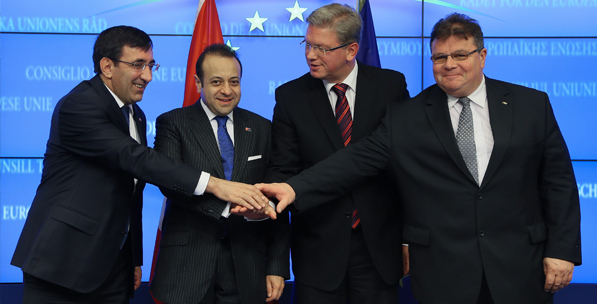December 16, 2013 was a momentous day in the history of Turkey-the European Union (EU) relations. With the arrival of the EU Commissioner for Home Affairs Cecilia Malmström, Turkey and the EU signed a Readmission Agreement (RA) and the process of visa liberalization dialogue has been officially initiated in Ankara. As readmission agreements bear some risks for the social order and internal security of signatory states, the EU has had to induce candidate countries to sign these agreements by offering certain initiatives. As the RA carries significant risks for Turkey such as the return of thousands of emigrants, the Turkish government initialized it in June 2012 but did not sign it for over a year. Meanwhile, the EU offered opening visa liberation negotiations in return for Turkey to sign the agreement. While entertaining the idea, Turkey insisted on the fact that it was necessary first to prepare a detailed road map for this process. After months-long negotiations, a road map for visa liberalization was finally drawn and signed concurrently with the RA.
It is difficult at this point to predict the social and economic consequences of implementing the RA and the road map. Initially the agreement will require Turkey to readmit Turkish citizens, stateless persons and the citizens of the third party countries having bilateral readmission agreements with Turkey, whereas the readmission of any other third country nationals will start three years later. During this three-year period, Turkey may want to sign more RAs with third countries and prepare the legal grounds for the transfer of the returnees sent from the EU to their native countries.
While introducing a number of provisions for Turkey to fulfill, these agreements at the same time encourage Turkey’s cooperation with EU institutions and neighboring countries on the matter of border security. This cooperation will be in the benefit of Turkey in terms of both its own security and the deepening of its Europeanization process. On the other hand, Turkey is requested to tighten its visa regime involving the third countries, which means that Turkey will need to halt, even to reverse, its visa liberalization policy that has been in effect for some years. As a result of this, Turkish citizens may face a tighter visa regime from these countries due to the reciprocity principle.
AFTER THE AGREEMENT?
As the road map progresses, the EU is expected to gradually introduce visa facilitation for Turkey. A full visa exemption is stipulated to take place at the end of the process through the EU’s standard procedures.
The Turkish government has accepted the road map with certain reservations. It has stated that Turkey will lift the reservation on the 1951 Geneva Convention of not accepting any refugees from the countries in its east and will put transit visas into force only after receiving full membership to the EU, and that it will continue not being a party to certain international agreements. However, the visa liberalization protocol clearly states that the lifting of visas will depend on the proper implementation of the road map. In this case, time will tell to what extent the EU will endorse Turkey’s reservations. Some countries may use them in the future as an excuse for rejecting visa exemption for Turkey.
If the reservations do not constitute an obstacle, the lifting of the visas will be possible at the end of the process with the affirmative vote of the qualified majority in the EU Council and the European Parliament, i.e., 55 percent of member countries and 65% of the EU population. It should be underlined that currently there are diverging views in the European Union regarding the free movement of persons. Lately, the EU has made it possible to revoke the visa-free regime with East and Southeast European non-member countries. The voting in the European Parliament on September 12, 2013 decided that should immigration from a visa-free country threatens the public order or security of a member country, visa proce



